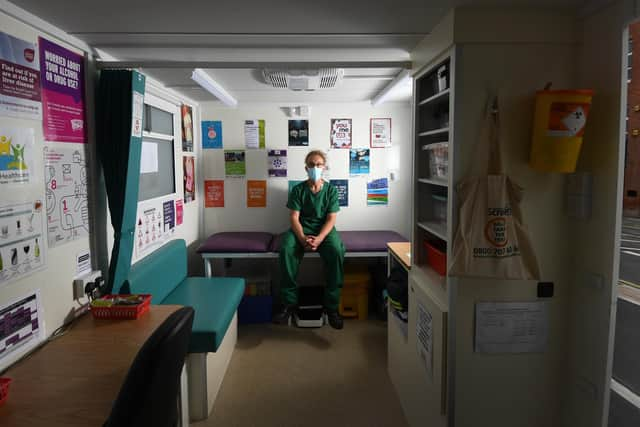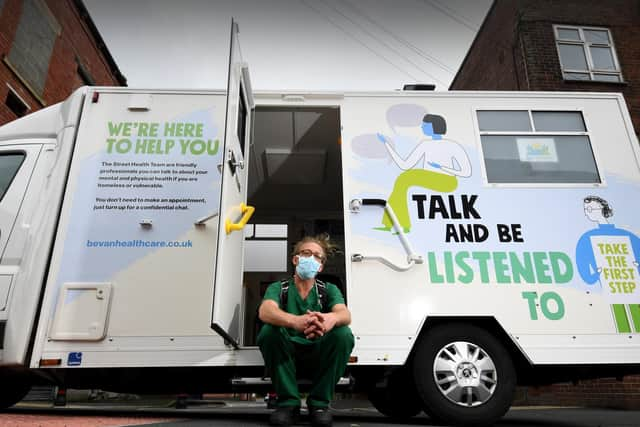How the needs of homeless people in Leeds were met almost overnight due to pandemic lockdown
and live on Freeview channel 276
Outreach workers say that almost overnight, they were given access to shelter, food, healthcare and the services which could help keep them off the streets in the future.
They are issues that the council, various charities and organisations, the police and outreach workers have been trying to address for years and now work is ongoing to make sure that the homeless people who want help with permanent accommodation continue to get that.
Advertisement
Hide AdAdvertisement
Hide AdDominic Maddocks, is a street health practitioner for Bevan Healthcare, which has a practice on York Street, and is a qualified paramedic.


He said: “Pre coronavirus, the only way we understood rough sleepers was to count people bedding down. In Leeds there were 50 and it was going up.
“During coronavirus we have re-housed about 300 people in emergency temporary accommodation. That means they were willing to be housed so got them inside and did a full assessment and worked out where is best - supported living, hostel, institutional care or an independent place.
“Maslow's hierarchy of needs (a psychological theory written in 1943) says to provide health care you need shelter and nutrition, and without these being met, there is almost no point trying to go any further.


Advertisement
Hide AdAdvertisement
Hide Ad“Almost overnight these needs were being met when lockdown happened.”
Mr Maddocks’ street health outreach team started going to the emergency accommodation sites to give health treatment, in partnership with other agencies, who can help with housing, drug and alcohol addition needs, as well as a meals on wheels type service being provided.
Within a few months health experts saw an improvement in engagement from rough sleepers because in the accommodation they had access to a landline, therefore phone appointments with a GP and other services, and, because of a change in physical environment there was an improvement in health.
Case Study
A 41-year-old man was released from prison around six weeks ago and ended up sleeping in a tent behind the train station. He came to see the street health team for a minor illness that was treated but they started a conversation with him. He admitted he had been a heroin user but wanted to change that. He had been clean while in prison but lapsed since release. By the end of the day the team had arranged a methadone prescription - removing the need to inject or criminal need to obtain drugs. The following day he went to emergency accommodation he had been offered, within a week, had been offered a flat of his own.
Advertisement
Hide AdAdvertisement
Hide AdMr Maddocks said: “That is the quickest I have been able to get somebody from a tent to a house - it was ten days. He was willing but the system was operating at a pace that could keep up with his enthusiasm.
System
“Either the patient does not keep up or the system does not, but quite often they run at a different pace. There is a missed connection and people go back through that revolving door.”
However, not all cases are as easy to solve and it can take weeks if not longer just to build up enough of a relationship with a rough-sleeper to get them to engage.
Mr Maddocks himself knows this more than most. A few years ago he had an addiction problem and was homeless but turned his life back around before being given a role with Bevan Healthcare.
Advertisement
Hide AdAdvertisement
Hide AdHe said: “I have a lived experience of addiction. I understand that not one element will fix things. Understanding that and just being very real and honest, compassionate and non-judgemental, patient and always putting them at the top of every decision you make.
“When you are homeless, you talk to a lot of people but not getting quality time with anyone. There is a lot of communication but no one gets to know you or your worries or cares. There is a survival element. Sometimes a relationship can take weeks to build before you can do anything that is deemed useful.
“Why people are homeless is complex and unique to every individual and starts at a very early age. We are talking about lots of people that have grown up in care, missed education both socially and academic skills. It is not uncommon to meet people with zero literacy skills and have never had employment. The idea of going to a certain place, at a certain time in a certain way is foreign.”
A message from the Editor:
Leeds has a fantastic story to tell - and the Yorkshire Evening Post has been rooted firmly at the heart of telling the stories of our city since 1890. We believe in ourselves and hope you believe in us too. We need your support to help ensure we can continue to be at the heart of life in Leeds. https://www.yorkshireeveningpost.co.uk/news/why-yorkshire-evening-post-needs-your-support-laura-collins-yep-editor-2913382 Subscribe to our website and enjoy unlimited access to local news and information online and on our app. With a digital subscription, you can read more than 5 articles, see fewer ads, enjoy faster load times, and get access to exclusive newsletters and content. Click here to subscribe. For more details on our newspaper subscription offers click here.